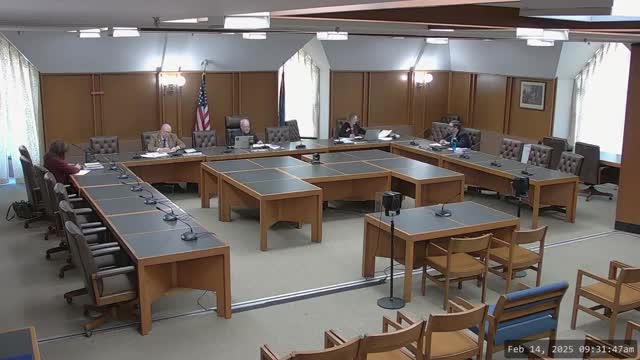New Hampshire subcommittee debates tightening ID rules for in-person and absentee voting; sends HB 472 back to committee
Get AI-powered insights, summaries, and transcripts
Subscribe
Summary
A bipartisan House subcommittee spent its Feb. 14 working session weighing several bills that would change voter identification and domicile verification rules, debated use of out-of-state and student IDs, and voted 5-0 to recommend ITL (Inexpedient to Legislate) on HB 472, which would have required voters to prove domicile at ballot check-in.
The House Election Law Subcommittee on Voter Registration and Impacts of Nonresident Voting spent its Feb. 14 working session reviewing a package of bills that would change how New Hampshire verifies voter identity and domicile, and how absentee ballots are issued.
The session, chaired by Representative Peter Newsom, opened with the subcommittee’s mission and a reminder that a final subcommittee report is due March 14. “We need to keep those 2 processes separate,” Representative Peter Newsom, chair of the subcommittee, said during debate, referring to voter registration on one hand and check-in to receive a ballot on election day.
Why it matters: The bills under review would alter the steps election officials use to confirm who is eligible to vote and where a voter lives. Changes could affect same‑day registrants, students living on campus, military and other out‑of‑state residents who recently moved to New Hampshire, and voters who request absentee ballots because of disability or other qualifying reasons.
Most of the meeting addressed whether forms of photo identification should be narrowed or supplemented by other proof of domicile, and how out‑of‑state driver’s licenses and student IDs are treated. Representative Lane, a subcommittee member and sponsor or co‑sponsor of some bills under discussion, said of one proposal requiring government photo ID to obtain a ballot: “The simple answer is yes. It does impact it tremendously, and it's clearly targeted, I think, at students.”
Michael O’Brien, a lobbyist at Prairie Strategies representing America Votes, urged the panel to distinguish identity from domicile. “IDs are used to prove identity,” O’Brien said, noting a passport can confirm identity but usually lacks an address. He recommended that if a photo ID does not carry a current address, registrants should be required to produce a separate document proving domicile.
Deputy Secretary of State Aaron Hennessy told the subcommittee the Secretary of State’s office currently records when a voter checks in using an out‑of‑state driver’s license and periodically sends letters to those voters, but local ballot clerks and many supervisors of the checklist do not have live access to the statewide voter registration system at every polling location. “We are not required to validate an ID,” Hennessy said, describing practical limits on what local election workers can verify at check‑in.
Subcommittee members and witnesses discussed several possible responses: changing what appears on town checklists, improving data sharing with the Department of Motor Vehicles (a bill in another committee would ask the DMV to contact voters who checked in with out‑of‑state licenses), and using notarization or other verification for mailed absentee applications. Deputy Secretary Hennessy warned that adding fields to printed checklists would lengthen them and could slow check‑in at busy polling places.
Absentee ballot proposals drew separate scrutiny. One bill discussed, HB 686, would require a color copy of a government photo ID and a notarized absentee‑ballot application; it would also allow a town or city clerk to require an in‑person cure for defective applications. Members questioned whether notarization and a color copy create barriers for infirm or homebound voters and whether technological alternatives (for example, secure image uploads run by the state) could provide verification without burdening local clerks.
On student IDs, the panel reviewed HB 684’s text, which as drafted lists government‑issued photo IDs that would satisfy the statutory requirement for obtaining a ballot; the sponsor’s title said the bill seeks to prevent use of student IDs, but the language instead specifies acceptable government IDs. Members noted potential drafting and intent mismatches and asked staff to clarify whether university student IDs count as government IDs when issued by a state institution.
Action taken: The subcommittee moved a recommendation on HB 472 (a bill that would have required voters without proof of domicile at check‑in to be directed to supervisors of the checklist and allowed immediate appeal to superior court). Representative Lane moved and Representative C seconded a motion recommending HB 472 be held Inexpedient to Legislate (ITL). The subcommittee approved the motion by voice/hand vote, 5‑0. The chair said the bill conflated registration and check‑in processes and would likely be better handled elsewhere or rewritten to separate those processes.
Other procedural notes: Chair Newsom reminded members that 10 House bills were assigned to the subcommittee via the Feb. 12 public notice (HB 217; HB 2809; HB 323; HB 365; HB 385; HB 418; HB 4702; HB 618; HB 6804; and HB 686) and that additional bills could be referred after they have a public hearing in the full Election Law Committee. The subcommittee’s full report is due Friday, March 14, which the chair flagged as likely the date of the final working session.
What’s next: Members asked the Secretary of State’s office for metrics on how often out‑of‑state IDs are used at check‑in (town‑level counts were requested) and for follow‑up about system or checklist changes that would allow clerks and supervisors to see past check‑in ID types without adding undue burden at polling places. The subcommittee and staff also flagged HB 385, a 19‑page bill affecting many sections of statute, for a separate, longer review session.
The meeting recessed and later adjourned after the HB 472 vote; members said they will reconvene for further work sessions to finalize recommendations for the March 14 deadline.
